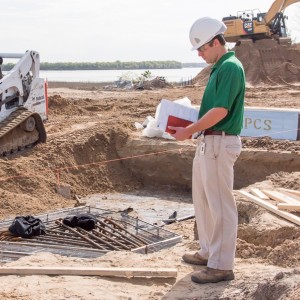
Civil engineering forms the backbone of modern industrial development, supporting essential infrastructure that enables efficient and sustainable manufacturing processes. At GEL Engineering, we specialize in providing expert civil engineering services that help industrial and manufacturing projects thrive in South Carolina and beyond.
From site development to utilities and environmental compliance, civil engineering plays a critical role in ensuring that large, complex facilities operate smoothly, safely, and efficiently.
The Importance of Civil Engineering in Industrial and Manufacturing Projects
Civil engineers design and oversee the infrastructure that supports manufacturing facilities — from building layouts and equipment foundations to stormwater systems and transportation networks. At GEL Engineering, our team of experts ensures every aspect of your project meets industry best practices and regulatory requirements.
Key areas where civil engineering is applied in industrial and manufacturing projects include: Site Layout and Planning
The foundation of a successful industrial or manufacturing project is a well-planned site. Civil engineers at GEL Engineering perform comprehensive due diligence and feasibility studies to evaluate:
- Soil Conditions: Critical for determining the right foundation design to support heavy industrial equipment.
- Topography and Drainage: Proper site grading and stormwater management prevent flooding and water-related issues that can disrupt operations.
- Accessibility: Designing roads, rail connections, and transportation infrastructure ensures smooth logistics for materials and finished products.
- Wetlands and Natural Resources: Civil engineers handle regulatory permits, environmental studies, and site mitigation to ensure compliance with state and federal regulations.
Utility Systems and Infrastructure
Industrial facilities depend on reliable access to utilities such as water, electricity, process gases, and telecommunications. Our team at GEL Engineering designs robust utility networks that integrate seamlessly with your operations.
We also design wastewater treatment systems, stormwater drainage, and solid waste management solutions that meet environmental standards while minimizing the impact on surrounding communities.
Transportation and Logistics
Manufacturing projects require the efficient movement of raw materials and finished products. Civil engineers design:
- Access roads and parking areas
- Rail connections and loading docks
- Bridges and specialized structures for oversized loads
A well-planned transportation network reduces costs, improves safety, and enhances operational efficiency.
Environmental Considerations
Industrial and manufacturing projects must meet stringent environmental regulations. At GEL Engineering, we prioritize:
- Sustainability: Incorporating green building practices, energy-efficient systems, and sustainable materials.
- Site Remediation: Developing strategies to clean and redevelop brownfield sites for new industrial uses.
- Regulatory Compliance: Navigating the complex landscape of federal, state, and local regulations to secure necessary permits and approvals.
Health and Safety
Worker safety is paramount in industrial settings. Our civil engineers collaborate with safety experts to design:
- Fire prevention systems, including sprinklers, fire-resistant materials, and emergency exits.
- Structural resilience measures to protect against earthquakes, floods, and other natural hazards.
Project Management and Coordination
Our project management team ensures your industrial or manufacturing project is delivered on time, within budget, and to the highest standards. We coordinate seamlessly with architects, contractors, and regulatory agencies to keep your project on track.
Challenges in Industrial and Manufacturing Projects
Civil engineering in industrial settings comes with unique challenges:
- Complex Designs: Heavy machinery, specialized equipment, and hazardous materials require customized design solutions.
- Regulatory Compliance: Adhering to EPA and state-level requirements demands constant diligence.
- Environmental Impact: Managing emissions, waste, and energy consumption requires innovative design and engineering.
- Budget and Time Constraints: Industrial projects often have tight timelines and large budgets — areas where GEL Engineering’s experience and expertise shine.
Civil engineering plays an essential role in the successful planning, design, and execution of industrial and manufacturing projects. From the foundation and structural integrity of the building to the transportation infrastructure and environmental impact, civil engineers ensure that every element of the facility is carefully designed to support the needs of the industry. Despite the challenges, the work of civil engineers is critical in ensuring that manufacturing operations run efficiently, safely, and sustainably.
As industries evolve and face new challenges, civil engineers continue to innovate, providing solutions that meet the demands of modern manufacturing while minimizing environmental impact and maximizing operational efficiency. With a solid foundation in civil engineering, industrial and manufacturing projects can thrive, driving economic growth and technological advancement.
Contact us today to learn how we can help with your next industrial or manufacturing site project.
